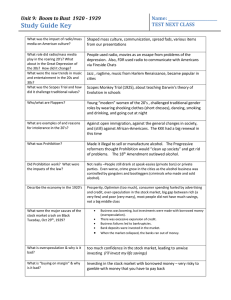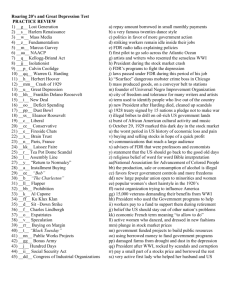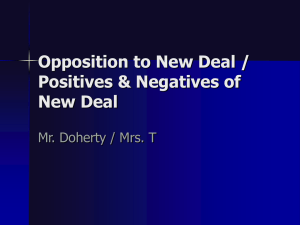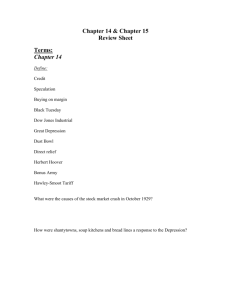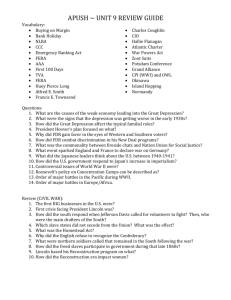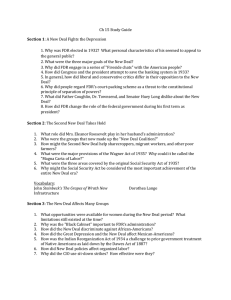Unit 8: Boom to Bust 1920
advertisement
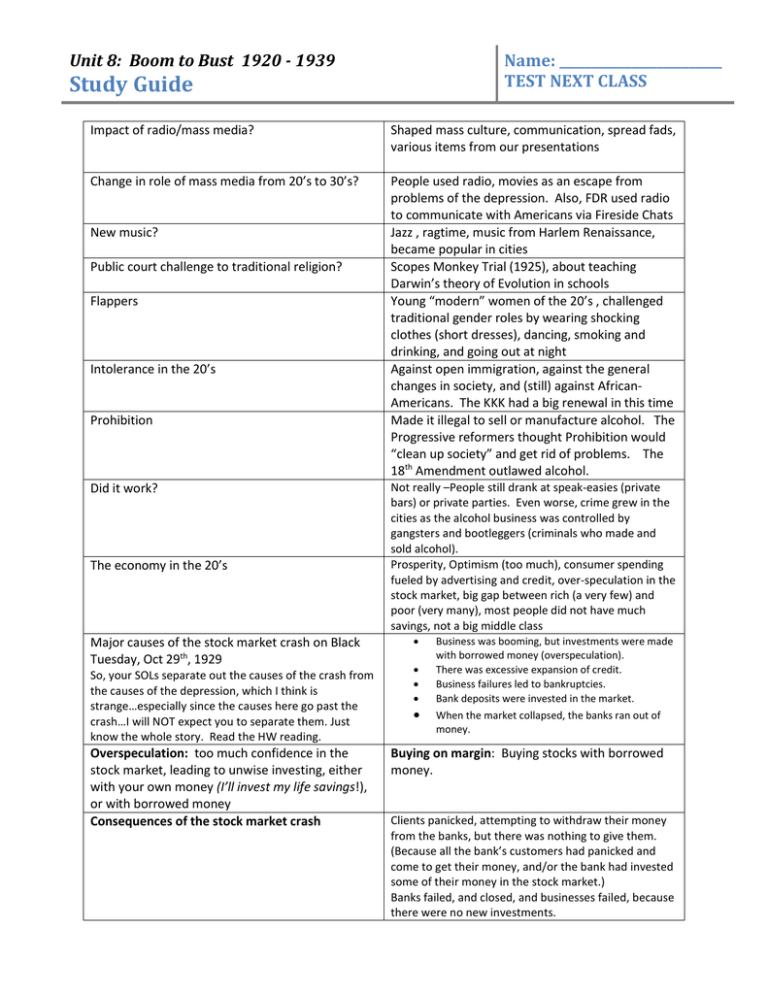
Unit 8: Boom to Bust 1920 - 1939 Name: _________________________ TEST NEXT CLASS Study Guide Impact of radio/mass media? Shaped mass culture, communication, spread fads, various items from our presentations Change in role of mass media from 20’s to 30’s? People used radio, movies as an escape from problems of the depression. Also, FDR used radio to communicate with Americans via Fireside Chats Jazz , ragtime, music from Harlem Renaissance, became popular in cities Scopes Monkey Trial (1925), about teaching Darwin’s theory of Evolution in schools Young “modern” women of the 20’s , challenged traditional gender roles by wearing shocking clothes (short dresses), dancing, smoking and drinking, and going out at night Against open immigration, against the general changes in society, and (still) against AfricanAmericans. The KKK had a big renewal in this time Made it illegal to sell or manufacture alcohol. The Progressive reformers thought Prohibition would “clean up society” and get rid of problems. The 18th Amendment outlawed alcohol. New music? Public court challenge to traditional religion? Flappers Intolerance in the 20’s Prohibition Did it work? The economy in the 20’s Major causes of the stock market crash on Black Tuesday, Oct 29th, 1929 So, your SOLs separate out the causes of the crash from the causes of the depression, which I think is strange…especially since the causes here go past the crash…I will NOT expect you to separate them. Just know the whole story. Read the HW reading. Overspeculation: too much confidence in the stock market, leading to unwise investing, either with your own money (I’ll invest my life savings!), or with borrowed money Consequences of the stock market crash Not really –People still drank at speak-easies (private bars) or private parties. Even worse, crime grew in the cities as the alcohol business was controlled by gangsters and bootleggers (criminals who made and sold alcohol). Prosperity, Optimism (too much), consumer spending fueled by advertising and credit, over-speculation in the stock market, big gap between rich (a very few) and poor (very many), most people did not have much savings, not a big middle class Business was booming, but investments were made with borrowed money (overspeculation). There was excessive expansion of credit. Business failures led to bankruptcies. Bank deposits were invested in the market. When the market collapsed, the banks ran out of money. Buying on margin: Buying stocks with borrowed money. Clients panicked, attempting to withdraw their money from the banks, but there was nothing to give them. (Because all the bank’s customers had panicked and come to get their money, and/or the bank had invested some of their money in the stock market.) Banks failed, and closed, and businesses failed, because there were no new investments. Major Causes of the Great Depression Impacts of Great Depression Why didn’t Hoover do more? What was FDR’s philosophy? How did FDR communicate? FDR’s plan? Three R’s? SSA: Social Security Act of 1935 Relief : direct payment to people for immediate help (Works Progress Administration—WPA) Recovery: designed to bring the nation out of the depression over time (Agricultural Adjustment Administration—AAA) and TVA. Reform : corrected unsound banking and investment practices (Federal Deposit Insurance Corporation—FDIC) and SEC Legacy of New Deal? 1. The stock market crash of 1929 and collapse of stock prices (obvious) 2. Federal Reserve’s failure to prevent widespread collapse of the nation’s banking system in the late 1920s and early 1930s, leading to severe contraction in the nation’s supply of money in circulation (the “heart” did not pump more $$ into the economy) 3. High protective tariffs that produced retaliatory tariffs in other countries, strangling world trade (Tariff Act of 1930, popularly called the HawleySmoot Act – dumb) Unemployment and homelessness Collapse of the financial system (bank closings) Decline in demand for goods Farm foreclosures and migration West Political unrest (growing militancy of labor unions) Didn’t think it was an appropriate role for the Fed gov’t. Thought it was business’s job to take care of boom/bust cycles in the economy (which were pretty common). He was a laissez-faire kind of Republican, pretty standard for his day.. He thought the government should have a more active role in solving problems. Fireside Chats. Radio addresses. Roosevelt rallied a frightened nation in which one in four workers 25% was unemployed. (“We have nothing to fear, but fear itself.”) New Deal: Relief, Recovery, Reform Social Security Act offered safeguards for workers. Safety Net social insurance, workers and empoyers pay into it, then when you’re too old or sick to work, you can get payments. WPA provided all kinds of jobs, construction,arts, teaching, etc. Also, CCC – Civilian Conservation Corps – for young men , jobs outdoors. AAA – tried to regulate the farming industry Federal Deposit Insurance Corp – insures deposits, so if your bank goes out of business (or burns down, or the owner runs off with all the money), you won’t lose all your money. The gov’t insures it. The legacy of the New Deal influenced the public’s belief in the responsibility of government to deliver public services, to intervene in the economy, and to act in ways that promote the general welfare. Some programs are still around today. STUDY FOR FREE RESPONSE (no big surprises here): KNOW YOUR CAUSES OF THE CRASH/DEPRESSION KNOW YOUR RESPONSES TO THE DEPRESSION (HOOVER AND FDR -- alphabet soup)
